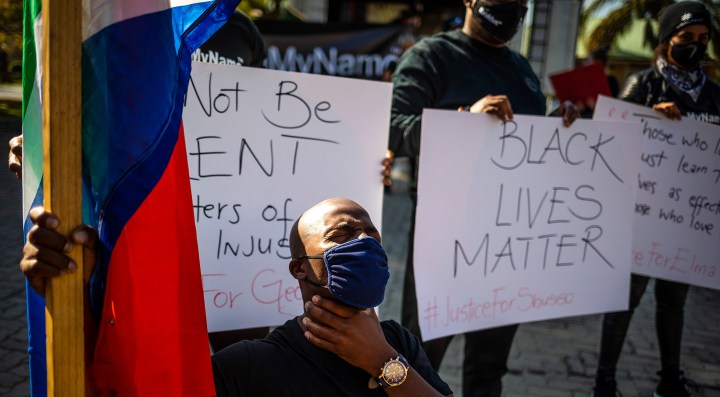Maverick Citizen Op-Ed
Call for independent investigation into Collins Khosa’s death

The past two weeks have seen the world rocked by yet another senseless killing of an unarmed black man at the hands of police. People across the world watched for nine minutes as George Floyd’s life was choked out of him on a Minnesota street. The pain and frustration of African Americans transcended borders and found solidarity here in South Africa.
The use of excessive force by police in South Africa is nothing new. The apartheid regime regularly used its security forces as a blunt instrument to quell resistance to whites-only rule.
But even in a democratic South Africa, law enforcement has done little to shed its brutal reputation.
Police watchdog, the Independent Police Investigative Directorate (IPID), recorded 393 cases of deaths as a result of police action, and 214 cases of deaths in police custody, in its 2018/19 annual report.
Most recently, outrage was sparked at the death of Alexandra resident Collins Khosa, who died after being allegedly assaulted by members of the South African National Defence Force (SANDF) while members of the Johannesburg Metro Police (JMPD) looked on. This happened during the nationwide lockdown after the soldiers saw a half-consumed glass of beer in Khosa’s yard.
The parallels between the death of Khosa in South Africa and that of George Floyd in the United States are clear: both were killed by law enforcement officials who used excessive, disproportionate and unnecessary force. In both cases, police stood by and did nothing to stop the brutality.
The report released by IPID into the Collins Khosa case found that none of the JMPD or SAPS officers present took steps to prevent the assault of Khosa from taking place at the hands of the SANDF. Not only does the report highlight the details and extent of the horrific incident, but also contains reports of witnesses being threatened and abused by these officials.
What is clear from the IPID report, is that these officers need to be held accountable. We welcome IPID’s recommendation that disciplinary steps be taken against the five JMPD and SAPS officers who were at the scene.
What is of particular concern, however, is the lack of independent oversight and complaints mechanisms for the SANDF. We are disappointed at the outcome of an SANDF report that clears the SANDF of any wrongdoing, noting that it directly contradicts a court judgment that Khosa was tortured and killed. It is also concerning that the code of conduct for members of the SANDF involved in ‘Operation Notlela’ falls short of what is necessary to comply with that judgment and international human rights law.
States should not use the military to carry out policing functions, except as a temporary measure in exceptionally serious circumstances where it is impossible for the authorities to rely solely on law enforcement agencies. When the deployment of the military becomes necessary, states must ensure that they comply with international laws and standards on the use of force, including ensuring that when the armed forces are deployed, they are always under the command of civilian authorities.
In his ruling on the Khosa case, Judge Hans Fabricius highlighted the pervasive inequality in South Africa, and the challenges poor and marginalised communities faced in complying with the national lockdown regulations. In this time of crisis, it is vital that law enforcement officials show restraint in the exercising of their powers. An approach based on consent rather than coercion should be encouraged. Furthermore, the SANDF code of conduct should be revised and accompanied by a commitment from SAPS and metro police leadership that security forces will be properly instructed, equipped and trained to carry out their function in a lawful, human rights-compliant manner.
While we are reassured by the president’s recent commitment to “spare no efforts in ensuring that those responsible are brought to justice”, we want to see an independent and impartial inquiry into the killing of Collins Khosa, and that the SANDF and JMPD officers are brought to justice in accordance with their right to a fair trial. IPID must be fully supported and transparent, and must take national and international human rights laws and standards into account. Further to this, all investigative reports into similar incidents must be made available to the public.
Impunity for crimes such as those committed against Collins Khosa and George Floyd cannot be tolerated. Excessive use of force by law enforcement officials cannot continue. It is high time South Africa ends this pattern of policing where black lives are under threat. No life should be taken recklessly, especially not by those who have sworn to protect and uphold the rights of all who live in South Africa.
At a time when a global pandemic threatens the lives and liberties of so many, our human rights need to be protected at all costs, not least by those who are tasked with doing so. DM/MC
Shenilla Mohamed is Executive Director of Amnesty International South Africa. She is a journalist, editor, human rights activist and defender. Her career spans three decades. She spent seven years working in the Gulf Region as Bureau Chief for the Gulf News and was Europe Middle East Editor for Inter Press Services.
"Information pertaining to Covid-19, vaccines, how to control the spread of the virus and potential treatments is ever-changing. Under the South African Disaster Management Act Regulation 11(5)(c) it is prohibited to publish information through any medium with the intention to deceive people on government measures to address COVID-19. We are therefore disabling the comment section on this article in order to protect both the commenting member and ourselves from potential liability. Should you have additional information that you think we should know, please email [email protected]"






 Become an Insider
Become an Insider